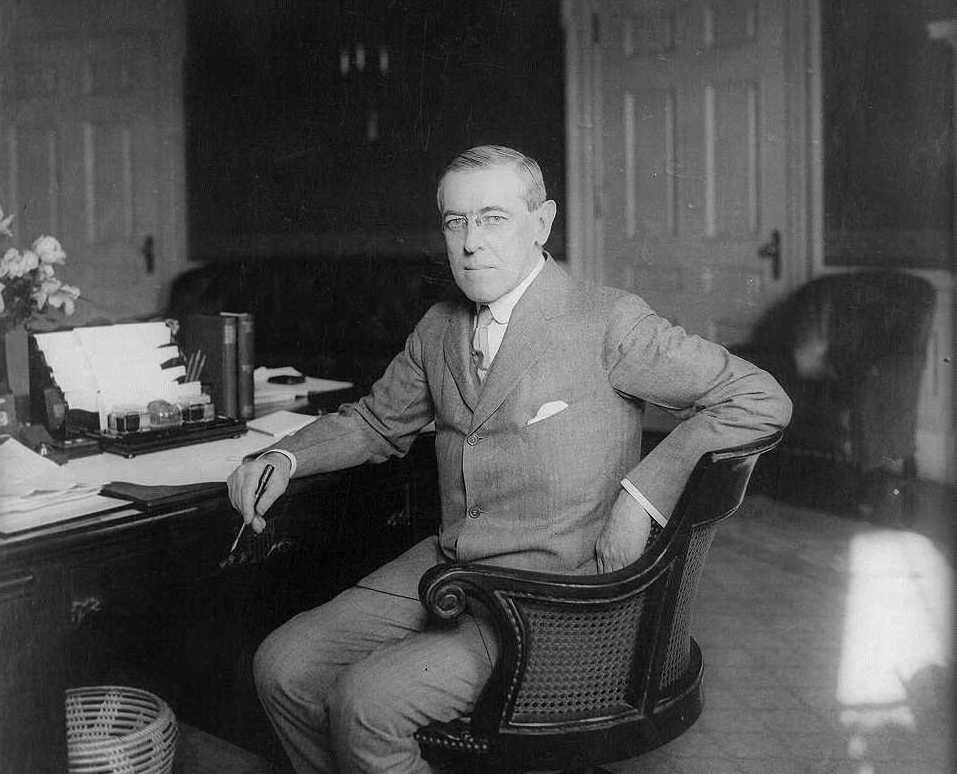In 1916 President Woodrow Wilson ran for reelection on the slogan, “He Kept Us Out of War.” It was a reference to World War I that was raging in Europe at the time and the majority of Americans wanted nothing to do with it. Wilson won reelection and in short order changed his mind and took America to the fight. In order to convince the country they needed to fight in what was understood as a “European entanglement” Wilson developed an idealistic vision of what America’s entrance into the war would mean for the world order.

President Wilson laid out Fourteen Points which he lauded as the reasons for America going to war and the reason why this war would mean an end to all wars. A massive deployment of US troops to Europe followed, along with a huge shift in national opinion. Failure to support the war was perceived as a near treasonous act. In many cities and townspeople who failed to buy war bonds were literally tarred and feathered.
The Spanish Flu
By 1918 the fighting in Europe was nearing an end even as the fight on another front was just beginning. That same year the first cases of what would become known as the Spanish Flu were documented at a military base in Kansas. For the next two years, the influenza pandemic bombarded the globe in three separate waves. The global spread of this massive pandemic was facilitated largely by the movement of troops from one nation to another over the course of the war’s final years.

- It afflicted nearly 25% of the US population.
- The average American life expectancy dropped by 12 years.
- Every nation in Africa was impacted by the flu.
- It spread across Europe and Asia.
- More than 50 million people around the world (the conservative estimate) died by the virus. This was more than twice the total deaths in World War I

What many are not aware of is the unique convergence of these two fights, the war and the pandemic, that occurred in Paris in 1919.
Everything Changed in Paris
The whole world changed at the 1919 Paris Peace Conference. Maps were redrawn. New treaties were established. New nations were born. There was no Middle East until 1919. Most of Africa was laid out and divided among the great powers in 1919. The same occurred for much of South East Asia.

(Seriously, if you enjoy history and international relations, one of my all-time favorites is the book Paris 1919 Six Months That Changed the World.)
When Woodrow Wilson arrived in Europe for the peace conference in 1919 he was the most popular man in the world. His Fourteen Points roused the global community to finally identify a sense of purpose in the cataclysmic violence that World War I unleashed upon the globe. The violence of the war was unprecedented and the levels of pointlessness in the fighting were increasingly evident.

Woodrow Wilson explained this was the place for a new beginning for the global order. The world would now move forward along the values of freedom and equality rather than great power manipulations. He introduced phrases like self-determination, and League of Nations, to the political lexicon of international politics.
Suddenly in the midst of the gloom of the war that was winding down, Wilson presented hope and purpose. By way of Wilson’s vision, the Great War might be known as “great” for what they accomplished in Paris rather than the terrible fatalities. Wilson was celebrated everywhere he went and hailed as an international hero by the people of the world who hoped for his vision to be established in Paris.

Wilson also held a monopoly on leverage for the peace negotiations that were about to begin. The conference was dominated by the Big Four of the global order – Britain, France, Italy, and the US. The British Prime Minister was hamstrung by political issues at home. The French Prime Minister literally arrived at the peace conference with a bullet in his shoulder after he survived an assassination attempt. Italy was a major player only in name.
The real power and influence lay with Wilson. As revolutions were springing up in Russia even as the peace conference opened, the leaders of the western world’s democracy dared not offend the people of the world by betraying the vision and ideals of Wilson’s Fourteen Points.
The Flu Comes to Paris

The name, Spanish Flu, is misleading at best. In the course of World War I, heavy press censorship limited reporting on the spread of the flu pandemic across the world. It was seen as unpatriotic to focus on such negative stories when our soldiers were fighting for their lives and the world’s freedom. This posture held true in both the US and Europe. Aside from the patriotism motive, others argued it was just influenza after all. The flu happened every year and the government and the media agreed that the general public did not need to be stirred up over something so trivial.
One exception was Spain who remained neutral in the war. As the pandemic spread from the US to Europe and then around the world, Spain’s media wrote openly about it. The pandemic did not start in Spain, but they were the first to openly discuss it. The rest of the world was still in denial. When people heard about the pandemic at that time, they heard about the pandemic in Spain.

As the leaders of the world’s governments converged upon Paris, people around the world were suffering from symptoms of this new influenza virus that doctors and scientists increasingly realized they were powerless to fight. President Wilson’s secretary was diagnosed with the flu. So was his daughter. In the return voyage from Paris at the conclusion of the peace conference a young Franklin Roosevelt caught the flu. Several on the ship he was traveling home aboard died from the flu and were buried at sea.
Wilson’s Sickness
As the Paris Peace Conference opened Wilson himself became sick. He was so sick that for a moment many believed the peace conference would be canceled. For many days he could barely sit up in bed. A strange paranoia struck the President. His doctors and staff members explained how Wilson became bizarrely protective of the furniture in his hotel room and worried that visitors planned to steal it. Spasms of coughing rocked Wilson for days.

For years historians believed Woodrow Wilson suffered a mini-stroke in Paris to explain the strange behavior that befell him in the course of his sickness. In 2007, the historian John M. Barry in his book The Great Influenza argued against this traditional view. The symptoms experienced by Wilson including high fever, coughing, and exhaustion were not symptoms of a stroke. They were symptoms of the flu. That is why Wilson’s own physician at the time, long before historians added to the record, diagnosed Wilson with the flu.
Even the strange paranoid behavior displayed by Wilson while he was sick in Paris reflected symptoms that others were describing by those afflicted with the flu in different parts of the world.
The End of the Fourteen Points

As Wilson recovered from his sickness most of his speaking in the official peace conference meetings was done by proxy messengers. His strange behavior continued. At one point he told the advisors gathered around his bedside, “Gentlemen, this is not a meeting of the Peace Commission. It is more a Council of War.” That was not the sentiment of the same man who previously designed the Fourteen Points.
One by one Woodrow Wilson bartered away the Fourteen Points. His entire focus began to centralize around the League of Nations. This was one of his ideas of an organization that pre-dated the United Nations and would work to prevent future wars.
While France, Britain, and Italy butchered the remaining Fourteen Points, they also crafted a new world order. The former imperialist system persisted but it was given new names and verbiage. Self-determination was all but eliminated as the lands of Africa, the Middle East and Asia became mandates for the great powers of Europe. Also significant, Germany was punished severely by the great powers at the peace conference for its part in the war. It was a punishment so severe that Germany would be crushed by the terms of the Paris Peace Conference.
All the while, Woodrow Wilson kept issuing handwritten orders to his messengers from his bedside. He was intent on saving the League of Nations. The idealistic vision he arrived in Paris with was destroyed. The heroic influence and leadership which the people of the world entrusted to him were quarantined to his sickbed where his behavior manifested in bizarre and sporadic tantrums.
The End of the Peace Conference

In the end, Woodrow Wilson returned home a much weaker and broken man. He attempted a cross country tour of the United States to sell his constituents on the idea of the League of Nations, which he bartered away the other Fourteen Points for. The League of Nations was the only achievement he walked away from Paris with. Before the US tour was complete, Wilson suffered a stroke and was paralyzed for the duration of his second term as president. He was hidden from public view and many see his wife Edith as the first female president of the United States. Edith screened visitors and documents sent to President Wilson, sometimes signing his name herself. She worked to keep the seriousness of Wilson’s condition hidden from the public and his political enemies.

A new President was elected to office and the new Congress opted to not even join the League of Nations. The betrayal of the Fourteen Point set the stage for the second World War that would follow less than two decades later. Germany was financially ruined and internationally humiliated by the terms of the conference. The environment of failed hope and betrayal in Europe served as fertile ground for authoritarian and fascist dictators to rise from Spain to Italy, Germany and beyond.
Many history books have been written that describe what occurred in World War I and the Paris Peace Conference, but few have suggested the influence played by the great Spanish Flu pandemic that was sweeping the globe at that time. It is very reasonable to assume there would not have been a Spanish Flu pandemic without World War I moving infected soldiers back and forth across the globe. But there also might not have been a World War II if it were not for the effects the Spanish Flu had on the Paris Peace Conference.

The tiny virus organisms that killed millions in the course of the Spanish Flu achieved one additional long-term effect that many of us have missed. They attached themselves to the President of the United States and helped push the globe into a state of affairs that led to the next World War.






